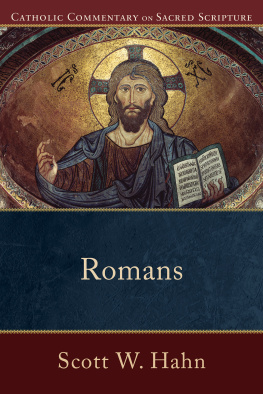Scott Hahn [Inconnu(e)] - A Pocket Guide to St. Paul
Here you can read online Scott Hahn [Inconnu(e)] - A Pocket Guide to St. Paul full text of the book (entire story) in english for free. Download pdf and epub, get meaning, cover and reviews about this ebook. year: 2010, genre: Religion. Description of the work, (preface) as well as reviews are available. Best literature library LitArk.com created for fans of good reading and offers a wide selection of genres:
Romance novel
Science fiction
Adventure
Detective
Science
History
Home and family
Prose
Art
Politics
Computer
Non-fiction
Religion
Business
Children
Humor
Choose a favorite category and find really read worthwhile books. Enjoy immersion in the world of imagination, feel the emotions of the characters or learn something new for yourself, make an fascinating discovery.
- Book:A Pocket Guide to St. Paul
- Author:
- Genre:
- Year:2010
- Rating:3 / 5
- Favourites:Add to favourites
- Your mark:
- 60
- 1
- 2
- 3
- 4
- 5
A Pocket Guide to St. Paul: summary, description and annotation
We offer to read an annotation, description, summary or preface (depends on what the author of the book "A Pocket Guide to St. Paul" wrote himself). If you haven't found the necessary information about the book — write in the comments, we will try to find it.
Scott Hahn [Inconnu(e)]: author's other books
Who wrote A Pocket Guide to St. Paul? Find out the surname, the name of the author of the book and a list of all author's works by series.
A Pocket Guide to St. Paul — read online for free the complete book (whole text) full work
Below is the text of the book, divided by pages. System saving the place of the last page read, allows you to conveniently read the book "A Pocket Guide to St. Paul" online for free, without having to search again every time where you left off. Put a bookmark, and you can go to the page where you finished reading at any time.
Font size:
Interval:
Bookmark:





Scott Hahn







 rying to write A Pocket Guide to St. Paul is more than a little like writing A Pocket Guide to Nuclear Physics or A Pocket Guide to Neurosurgery. St. Paul is the most influential writer in the history of literature. His work comprises a significant portion of the most influential book in all human history. His erudition was vast, his thought complex, and his accomplishments prodigious. For the magnitude of his effect on the course of human events, he has no rival except his master, Jesus Christ, whose Gospel St. Paul served and proclaimed.
rying to write A Pocket Guide to St. Paul is more than a little like writing A Pocket Guide to Nuclear Physics or A Pocket Guide to Neurosurgery. St. Paul is the most influential writer in the history of literature. His work comprises a significant portion of the most influential book in all human history. His erudition was vast, his thought complex, and his accomplishments prodigious. For the magnitude of his effect on the course of human events, he has no rival except his master, Jesus Christ, whose Gospel St. Paul served and proclaimed.
Yet here we are, trying to fit St. Paul in our pockets!
Early Christian historians tell us that the Apostle Paul was indeed small of stature, perhaps little more than five feet tall. Nevertheless, he stands before us as a giant. The achievements of Alexander the Great, Caesar Augustus, William Shakespeare, Albert Einstein - grand as they are - seem small when compared to the achievements of St. Paul. C. S. Lewis imagined that an encounter with St. Paul, even in heaven, would be "rather an overwhelming experience." He recalled that "when Dante saw the great apostles in heaven they affected him like mountains."
Paul had singular gifts. Some scholars argue that, if he had gone into philosophy, he would have surpassed Plato and Aristotle. But he was not merely a thinker. He was a pastor as well, and a missionary. He traveled far and wide to win souls. He negotiated for the peace of the Church. He corrected and encouraged people. He preached and he wrote with passion and wit. He suffered much, and ultimately, he died for the cause.
He aimed to extend the reach of Christianity through all the western lands of the Roman Empire. And he succeeded to an astonishing degree. By the end of his life - and largely thanks to his efforts - Christianity enjoyed a worldwide presence. Within a century - largely due to the momentum of Paul's preaching - the Church had grown so large that it was perceived as a threat to the Roman social order. Less than three centuries after Paul's martyrdom, Rome was a Christian city at the head of a Christian empire.
That was his first revolution, but not his last. He has emerged repeatedly down the millennia as a fresh voice, compelling preachers, rulers, and ordinary Christians to envision a new way of living. In the fifth century, St. Augustine re-thought the world along lines that he discerned in St. Paul. In the 16th century, Paul's letters were at the center of the controversies of the Protestant Reformation and the Catholic Counter-Reformation - controversies that reshaped the world.
It's hard to exaggerate St. Paul's importance, though some people do. He was not the "founder of Christianity" or its "inventor," as a few scholars contend. Christ himself founded the Church, and he founded it on another Apostle: St. Peter. But Christ did call Saul of Tarsus and commissioned him to receive the Gospel and take it to the world. Paul gratefully acknowledged his debt not only to Jesus, but to the Apostles Peter, James, and John (see Gal 1:18; 2:9). So, though Paul did not found the Church of Jesus Christ, he founded many churches in Jesus' name.
But, uniquely inspired by God, he developed a theology of the Church that was authoritative. The Churchs self-understanding is dependent upon the words of St. Paul. Every Christian's self-understanding should be, too. We cannot understand Christianity unless we understand his message. We cannot understand ourselves as Christians unless we see ourselves in the light of his letters.

 he New Testament is our richest, most ancient, and most reliable source of information about St. Paul. Of its 27 books, 13 are letters attributed to St. Paul. (Many Church Fathers, and a small but growing number of modern scholars, credit him with a 14th letter as well, the Letter to the Hebrews.)
he New Testament is our richest, most ancient, and most reliable source of information about St. Paul. Of its 27 books, 13 are letters attributed to St. Paul. (Many Church Fathers, and a small but growing number of modern scholars, credit him with a 14th letter as well, the Letter to the Hebrews.)
In addition to those more direct sources, we find a detailed account of St. Paul's travels in the Acts of the Apostles, which was written by St. Luke, one of the Apostle's traveling companions (see 2 Tim 4:11; Philem 24). The Second Letter of Peter also gives us brief but valuable observations about Paul. In just two verses, Peter manages to confirm the authority and office of his fellow Apostle. He describes Paul as a "beloved brother," rich in wisdom, and he discusses Paul's writings explicitly as "Scriptures" - though he acknowledges that "there are some things in them hard to understand" (2 Pet 3:15-16). A final New Testament witness is St. Luke's Gospel, which was surely influenced by Paul. Thus, well over half the New Testament bears some testimony to the life and doctrine of Paul.
Paul's influence was immediate, profound, and widespread. All of the writers of the generation after his own - the Apostolic Fathers - show a familiarity with his work. Many quote him directly.
In the 2,000 years since St. Paul's martyrdom, Christians have produced many commentaries on him. In my own library, I have more than a thousand such books - and they are but a small fraction of the works in print! And the works in print are a still smaller fraction of the works that have vanished from memory. Yet Paul's life and work still hold Christians spellbound - and theological reflection produces new insights even today. His teaching is an inexhaustible treasury.

Early Life
St. Paul was born, probably in the first decade of the first century A.D., in the city of Tarsus, in the Roman province of Syria-Cilicia (on what is now the southeastern coast of Turkey). Tarsus was a metropolis, a center of commerce and education. Paul was born into a devout Jewish family, but he was born a Roman citizen (Acts 22:28), a rare privilege, not easily attained in the provinces. Saul was the name he used among his fellow Jews; Paul was his Roman name. As a child, he apparently received an excellent education in Greek culture, evident in his preaching and writing (Acts 17:28, for example).
Next pageFont size:
Interval:
Bookmark:
Similar books «A Pocket Guide to St. Paul»
Look at similar books to A Pocket Guide to St. Paul. We have selected literature similar in name and meaning in the hope of providing readers with more options to find new, interesting, not yet read works.
Discussion, reviews of the book A Pocket Guide to St. Paul and just readers' own opinions. Leave your comments, write what you think about the work, its meaning or the main characters. Specify what exactly you liked and what you didn't like, and why you think so.

![Scott Hahn [Inconnu(e)] A Pocket Guide to St. Paul](/uploads/posts/book/134749/thumbs/scott-hahn-inconnu-e-a-pocket-guide-to-st-paul.jpg)
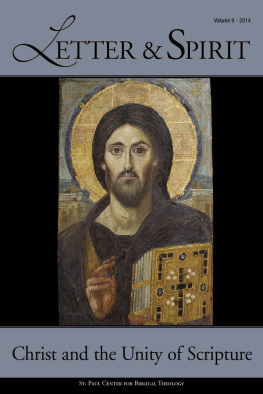
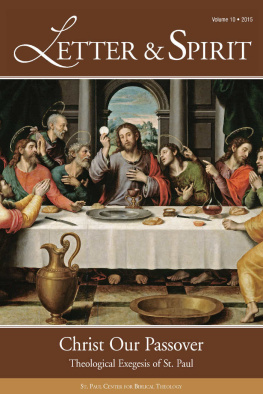
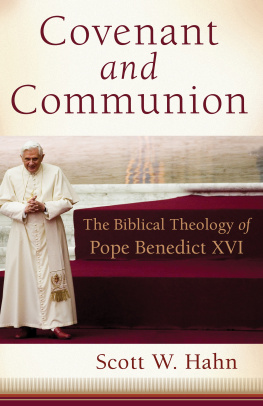
![Scott Hahn [Inconnu(e)] - Scripture Matters: Essays on Reading the Bible From the Heart of the Church](/uploads/posts/book/134760/thumbs/scott-hahn-inconnu-e-scripture-matters-essays.jpg)
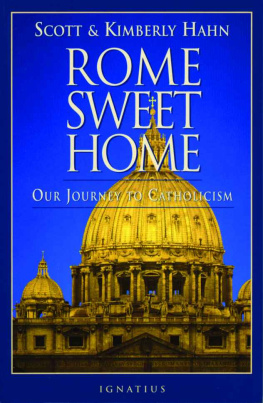
![Scott Hahn [Inconnu(e)] - Letter and Spirit: From Written Text to Living Word in the Liturgy](/uploads/posts/book/134755/thumbs/scott-hahn-inconnu-e-letter-and-spirit-from.jpg)
![Scott Hahn [Inconnu(e)] - Lenten Reflections From a Father Who Keeps His Promises](/uploads/posts/book/134754/thumbs/scott-hahn-inconnu-e-lenten-reflections-from-a.jpg)
![Scott Hahn [Inconnu(e)] - Joy to the World: How Christ’s Coming Changed Everything (and Still Does)](/uploads/posts/book/134753/thumbs/scott-hahn-inconnu-e-joy-to-the-world-how.jpg)
![Scott Hahn [Inconnu(e)] - Evangelizing Catholics: A Mission Manual for the New Evangelization](/uploads/posts/book/134752/thumbs/scott-hahn-inconnu-e-evangelizing-catholics-a.jpg)
![Scott Hahn [Inconnu(e)] - A Pocket Guide to the Bible](/uploads/posts/book/134750/thumbs/scott-hahn-inconnu-e-a-pocket-guide-to-the.jpg)
![Scott Hahn [Inconnu(e)] - A Father Who Keeps His Promise: God’s Covenant Love in Scripture](/uploads/posts/book/134748/thumbs/scott-hahn-inconnu-e-a-father-who-keeps-his.jpg)
